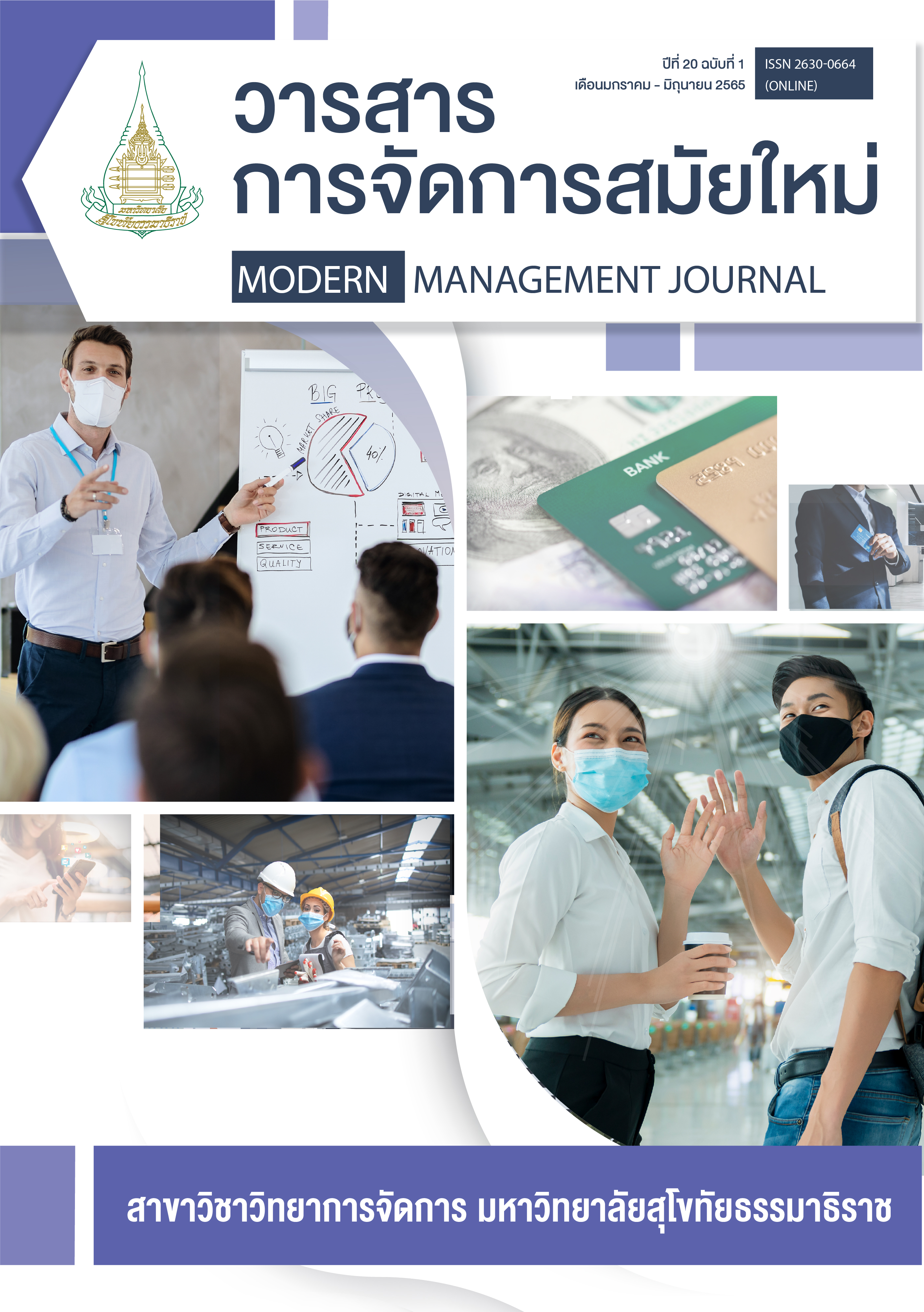A Scenario of Banking Industry in Thailand: A Five-Year Picture
Keywords:
Scenario, Banking Industry, Driving FactorsAbstract
This study investigates the scenario of banking industry in Thailand in the next five years. It explores driving factors affecting the industry in 2006, then creates three cases of scenario; best case, worst case and most possible case. By conducting online questionnaires with 100 people working in Thai banks as the samples, descriptive analysis and thematic analysis are adopted. The empirical findings show the three driving factors positively affect the banking industry are educating and preparing to adopt FinTech, the growth of real estate industry, and an increase demand of personal loan. The findings present three driving factors negatively affect the banking industry are Covid19, political, and the volatility of capital market. These factors are used to create the scenario of banking industry in Thailand in the next five years.
References
Bank of Thailand (2020). Annual Report of 2020. Retrieved from https://www.bot.or.th/Thai/ResearchAndPublications/Report/AnnualReport/Documents/AR2020/AnnualReport2020.pdf
Decharin, P. (2004). Implementing balanced scorecard. Chulalongkorn University Press.
Doppelt, B. (2017). Leading change toward sustainability: A change-management guide for business, government and civil society. Routledge.
Giovannoni, E., Quarchioni, S., & Riccaboni, A. (2016). The role of roles in risk management change: The case of an Italian bank. European Accounting Review, 25(1), 109-129.
Iamyingpanich, C. (2020). Fitch estimates COVID-19 negatively affecting banking. Retrieved from https://www.efinancethai.com/LastestNews/LatestNewsMain.aspx?release=y&ref= M&id=V01JQThha3UvTDQ9
Kaewtan, J. (2014). Factors influencing the acceptance of electronic payment using smartphone devices: In case of Bangkok and Pathum Thani. [Doctoral thesis, Rajamangala University of Technology Thanyaburi]. Retrieved from http://www.research.rmutt.ac.th/?p=14971
Khanankhang, N. & Lowatcharin, G. (2019). Adaptation Of Financial Institutions in Thailand to The Trend of Digital Banking. Journal of Buddhist Education and Research. 5(2), 376-388.
Khongsanoh, P. (2017). Restructuring the Thai economy into "Thailand 4.0". Retrieved from https://dl.parliament.go.th/backoffice/viewer2300/web/previewer.php
Kiranandana, T. (1994). Social science research. Chulalongkorn University Press.
Mokkaranurak, D. (2011). The Scenario of Vocational Education in Thailand During the Next Decade (2011-2021). Retrieved from http://www.esarntech.ac.th/research.php?id_wkg=W59-0367
Montazemi, A. R., & Qahri-Saremi, H. (2015). Factors affecting adoption of online banking: A meta-analytic structural equation modeling study. Information & Management, 52(2), 210-226.
Piluntananon, N. (1983). Future science. Odeonstore.
Plianpairoj, P. & Sorakraikitikul, M. (2019) Commercial banking employee Perspectives and adaptability in the digital banking age. Burapha Journal of Business Management. 8(1), 62-80. Retrieved from https://www.ktbst.co.th/th/knowledge-detail.php?id=198
Thanadhidhasuwanna, T. (2017). Realize and understand: A new context for financial institutions in the 4.0 era. Retrieved from https://www.krungsri.com/bank/getmedia/367d598f-7779-48eb-95b0-41e0bebd4974/THIP_07_Banking40_TH.aspx
Thongsuddhi, V. (2008). Good governance. Intapas Publishing House.
Udomrachtavanich, W. (2019). Adaptation of financial institutions in the digital era.
Wiriyasart, S. (2018). Adopting Financial Technology at Thai Commercial Banks Fintech. Thammasat Printing House.
Downloads
Published
How to Cite
Issue
Section
License
Copyright (c) 2022 Modern Management Journal

This work is licensed under a Creative Commons Attribution-NonCommercial-NoDerivatives 4.0 International License.



